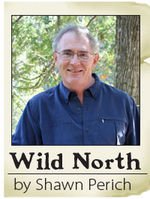
Recently, en route on the Information Highway to other things, I stumbled upon a 2009 New York Times story about urban dwellers who are turning to hunting as way to acquire healthy, inexpensive meat. Many are drawn to hunting as a logical extension of their effort to “eat locally” by purchasing organic produce from local farmers or growing it themselves. They are taking classes and forming clubs to learn about and participate in subsistence hunting.
The story featured urban hunters in suburban Washington, D.C. And San Francisco who were drawn to hunting as adults due to their interest in healthy eating. In San Francisco, founders of a hunting club largely comprised of young professionals had difficulty finding information about hunting in the Bay Area. They now meet and share meals featuring wild game killed by club members.
Wild game and fish procured by hunting and fishing are taken for granted by many Minnesotans. But even here, no doubt there are people who would like to learn about hunting and fishing simply to get food to eat. They may become our new traditionalists. While most of us eat what we catch or kill, it may be more of a ritual meal than a healthy, inexpensive dinner. We spend way too much on gear and gizmos to say we are motivated by subsistence.
While trophy hunting and catch-and-release fishing currently loom large within the outdoor realm, the future of hunting and fishing more likely hinges upon a continued human desire to catch a fish or kill a deer for dinner. However, hunters and anglers are not always welcoming to those with less lofty ambitions than their own. We call them “meat fishermen” or express outrage when they kill an immature whitetail buck. Some who fish for trout, muskies or bass go so far as to say their favored species should be fully protected from harvest.
Fish and game bag limits and regulations are intended to protect these publicly held resources from overharvest. But rules originally motivated by conservation have increasingly become to create more and bigger fish or deer to address social demands of hunters and anglers. We don’t need to protect muskies until the are 50 inches long or whitetail bucks until they grow bigger antlers for conservation purposes—we do it because some anglers and hunters want to catch big fish or shoot big deer.
While we don’t need to change existing rules simply to accommodate beginners, we should take a hard look at how well we provide opportunities for folks who simply want to bring home something to eat. These are people who want to take up fishing and hunting without making more than a modest investment in gear or travel. What they need are close-to-home opportunities to catch fish or go hunting, as well as the necessary skills to do so. I not sure these folks are well-serve by our present system of outreach and education. With a little more surfing on the Information Highway, I found it was a lot easier to find out how to plant food plots to attract trophy deer than it was to learn how to catch fish for food. Something, folks, is wrong with that picture.
Elsewhere in my reading, I discovered last year’s massive oil spill in the Gulf of Mexico taught veteran environmental journalist Ted Williams a couple of things. Writing in the February
issue of Outdoors Unlimited, published by the Outdoor Writers Association of America, Williams says, what he learned wasn’t reported by the media. But it bears repeating here.
The first thing Williams learned was that President Obama and Interior Secretary Ken Salazar were not the men he thought they were, because when the political heat started to rise, they callously sacrificed Liz Birnbaum, director of the Minerals Management Service. Her decision to resign from her job appears to have been strongly encouraged by Salazar.
Birnbaum’s previous experience was impressive. She served as counsel for American Rivers, the National Wildlife Federation and the House Committee on Natural Resources, as well as President Clinton’s associate solicitor for mineral resources. Although she was only on the job for 10 months, she had begun science-based reforms within the agency. After her resignation, President Obama said the pace of her reforms was “too slow.”
Although the spill was bad, and there was little to be done by Obama or anyone else to make it better. However, the spill’s environmental consequences may not be as bad as you think. Williams writes: “Unlike Alaskan oil, Gulf oil was so volatile that nearly half evaporates instantly when it hits the surface. High temperatures caused much of the remaining oil to break down rapidly. Most oil that sank or drifted below the surface in plumes now cannot be found. While fish eggs and larvae took a major hit from even light sheens, most adult fish toughed it out, or, as with mackerels, tunas and billfish, fled. And because commercial and even recreational fishing was shut down for weeks, next year’s spawn will be monumental.”
While the long term ecological effects of the spill are unknown, most fish and wildlife populations will soon recover, Williams concludes. The spill was a terrible disaster, but it is reassuring to know Nature has the restorative power to recover from man’s mistakes.
